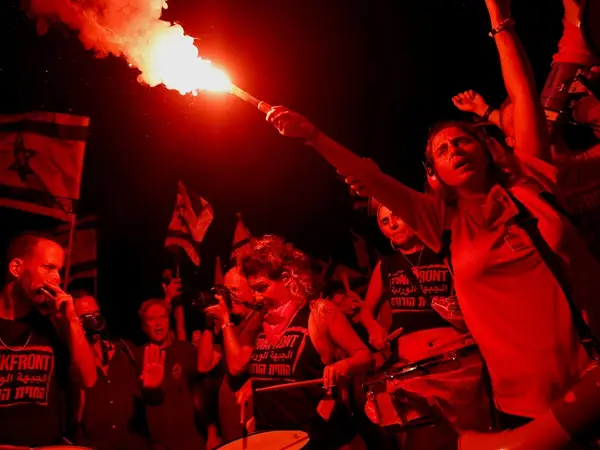The Israel air force chief has said its country's enemies might exploit the political crisis triggered by an overhaul of the judiciary, seeing it as an opportunity.
Major-General Tomer Bar said his forces needed to remain "vigilant and prepared" after parliament Monday passed the first of Netanyahu's widely contested changes, removing the Supreme Court's authority to void what it deems "unreasonable" decisions by government and ministers.
"It is possible that at a time like this they (Israel's enemies) will try to test the frontiers, our cohesion and our alertness," Bar said in an address to his forces, according to a statement released on Friday. He did not elaborate.
Reuters reported this week that Iran’s IRGC and security officials held a three-hour meeting last week with the Lebanese Hezbollah and Palestinian Hamas to see how they can take advantage of Israel’s internal problems.
The overhaul pursued by Netanyahu and his right-wing government has sparked a seven-month crisis, spurring unprecedented protests, opening up a deep social divide and shaking the commitment to call-up duty of some army reservists.
As the crisis escalated following Monday's vote, Israel's Ynet news said Netanyahu received at least four letters from Military Intelligence warning of serious security ramifications arising from the judicial overhaul.
According to the report, senior intelligence officials said Israel's enemies, particularly Iran and its heavily armed proxy in Lebanon, Hezbollah, view the crisis as a historic low point in the country's history.
A spokesperson for the prime minister declined comment.
Iranian government media and those of his proxies have been highlighting Israel’s political crisis, claiming that end of the Jewish state is near.
A poll conducted by Maariv, one of Israel's leading newspapers, found that 58 percent of Israelis feared civil war, and 36 percent thought the right thing to do is for government to stop the judiciary legislation immediately, compared to 22 percent who said it should be promoted unilaterally.
Protesters say growing numbers of military reservists have decided to stop serving to express their opposition to the overhaul. The military has acknowledged an increase in requests to abstain from service, and said that damage would be done, gradually, to war-readiness if the no-shows proved protracted.
Netanyahu has argued that the change made this week is “a minor” issue and it is “silly” to say Israel will no longer be a democracy.
Political watchdog groups have appealed to the Supreme Court to strike down the new law, paving the way to a showdown among branches of government when it hears the arguments in September.
The legal tussle could begin next Thursday when the top court will hear an appeal against a coalition bill ratified in March that limited conditions for removing the prime minister from office.
Israel's democratic foundations are relatively fragile, and the Supreme Court is seen as crucial for protecting civil rights and the rule of law. The country has no constitution, the government holds a 64-56 majority in the one-chamber Knesset and the president's office is ceremonial.
Netanyahu says the changes will balance government branches. He casts the protests as a bid to thwart his democratic mandate.
His plans have hit the economy, triggering foreign investor flight. Deepening domestic political uncertainty will reduce economic growth this year, S&P Global Ratings said in a report.
The judicial reform drive, along with an expansion of Jewish settlements on occupied land where Palestinians seek to establish a state, have also weighed on relations with Israel's most important ally the United States.
(With reporting by Reuters)
